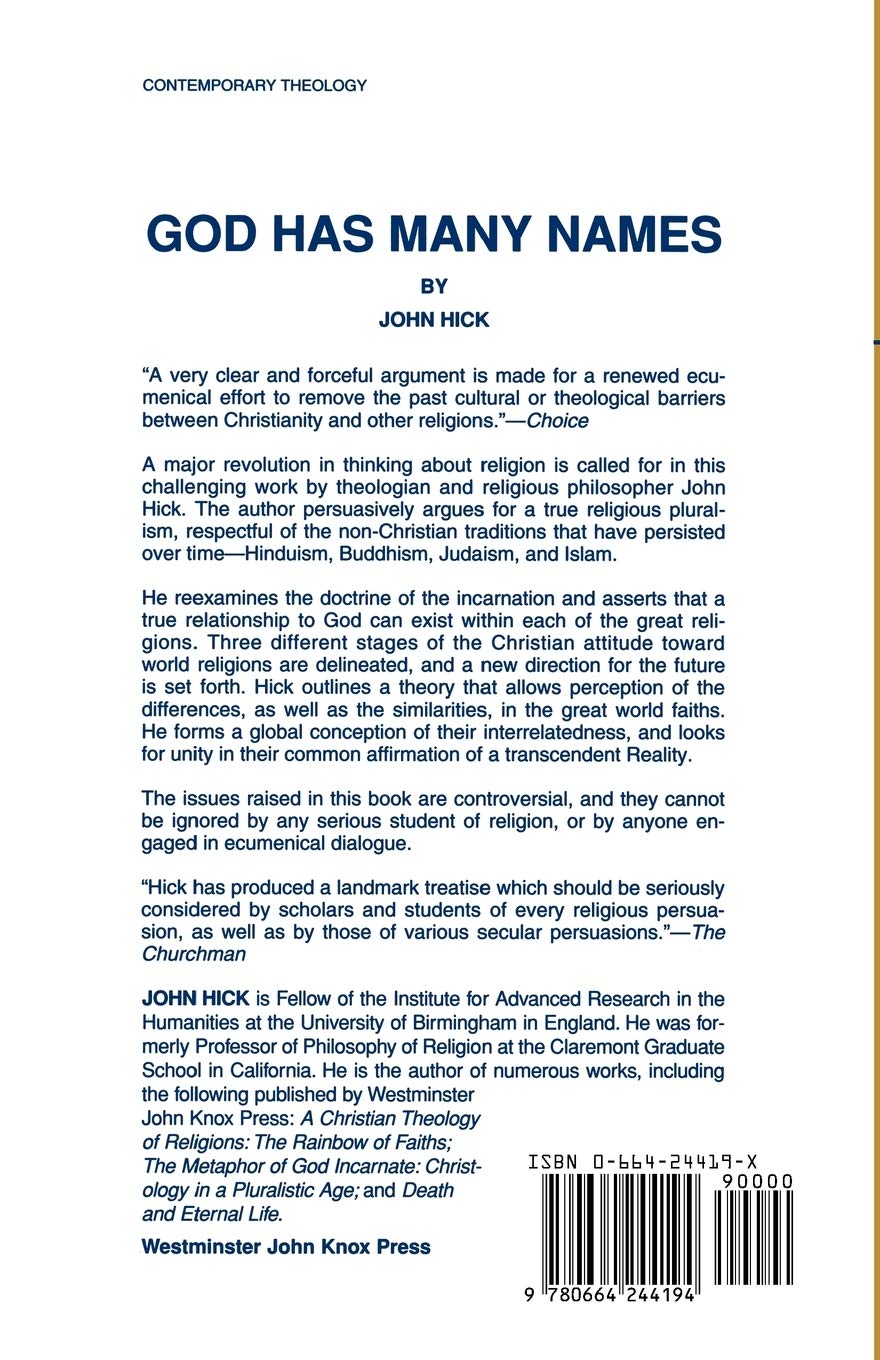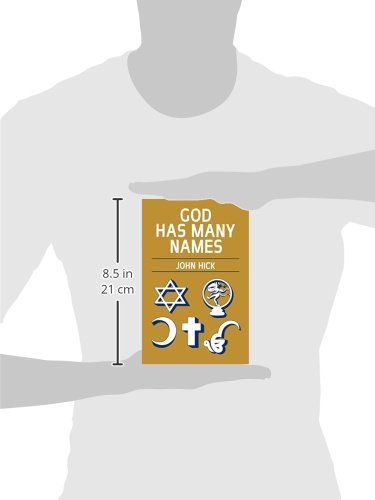



God Has Many Names
S**N
Prompt Service
I received the book in great condition and sooner than I expected. Great commitment to service and delivery. Thank you.
M**A
Enlightening
Depending on where your faith is placed, this book will be one of your favorites or heretical!! Because pluralism speaks to me, it is one of the most enlightening books I have ever read. I believe God is real and found in many "forms". As Hicks quotes from the Bhagavad-Gita......."Howsoever men may approach me, even so do I accept them; for, on all sides, whatever path they may choose is mine".
Z**H
Five Stars
Classic theology text
W**Z
Joh Hick: God Has Many Names
This book provides an excellent overview of Hick's Pluralistic Theology of Religions - accessible to the general public. Whether you agree or disagree with Hick's pluralistic conclusions, the philosophical grounding of his arguments against Christian exclusivism have set the stage for over 50 years of continued debate and dialogue on the subject. I recommend this book for anyone interested in the phenomenon of religious diversity, questions about conflicting religious truth claims, the possibility of salvation beyond any given religious tradition, religious pluralism, and many other areas to which John Hick is an internationally recognized author and scholar.Note: For a more thorough presentation of Hick's pluralistic theology of religions, see John Hick "An Interpretation of Religion". An Interpretation of Religion: Human Responses to the Transcendent, Second Edition
L**Y
The Challenge of Pluralism
This is one of the first books I read after moving from Christianity to agnosticism to a more theistic worldview. John Hick is one of the leading philosophers promoting the idea that all axial (major) religions are valid paths to god as well as many lesser known belief systems. Being that his audience is mainly composed of Christians or influenced by Christian culture, Hick focuses on Christian exclusivists (those who believe in only one way to God and that being Christianity) must overcome their confining worldview in light of the fact Christianity has failed to bring about the Kingdom of God; we're no better than other cultures and sometimes worse. Anyone wishing to defend an exclusivistic path should read this or any of the other books among Hick's publications. Anyone thinking Christianity might be wrong in it's traditional approach should also read this book to discover a new, valid approach. As Paul said, "...when I became an adult, I put away childish things."
A**C
Solid argument for religious pluralism
As a leading apologist for religious pluralism, Hick in this book profusely offers sound proof for the case. The erudite philosopher diligently gathers a bundle of psalms, scriptures and theologies from the world's monotheistic religions, concluding convincingly that all ways worshiping the Creator,or First Cause, or Eternal Being have congenial essence and each one reflects its own cultural influence on the perception of the Supreme Being.Very well done, Mr Hick. This book seems less verbose than his other marvelous work "Metaphor of God Incarnate" but more knowledge-oriented.
A**Y
A failed attempt to justify a logical contradiction
Although very well written and argued, I have to completely disagree with Hick's conclusions at the end of the day. The main problem is that Hick is trying to logically justify a logical contradiction; he says that Buddhists and Christians both believe in essentially the same Ultimate Reality, yet Buddhism and Christianity could not be more opposite of each other in terms of what each religion teaches and believes. Christians, for example, believe there is a personal supernatural reality called God who is the creator of all things, that human beings have an unchanging immaterial soul, that there is life after death, and that good and evil are real concepts; Buddhists, on the other hand, believe that there is no supernatural reality, that Nirvana is the ultimate impersonal reality, that human beings do not have an unchanging immaterial soul, and that good and evil are mere illusions. If Christians and Buddhists are responding to the same Ultimate reality, why are they getting such contradictory results?What's more, Hick argues, while claiming to be a Christian, that this one Ultimate Reality that all religionists believe in is in fact impersonal. So he implicitly agrees with the Buddhists and Hindus who believe that the Ultimate Reality is impersonal. The fact is, if you are a Christian, Jew, or Moslem, you MUST believe that God is personal, otherwise your faith does not make sense. I think that deep down, he probably still believed that God was personal, but for some odd reason, he felt a desire to critique this belief.Nonetheless, I would say that I do agree with his critique of the doctrine of the Incarnation; Hick is correct in pointing out that almost every Christian who has tried to write down the doctrine of the Incarnation in logical terms, they have been labeled as heretics. Why? Probably because the doctrine of the Incarnation so understood in a literal sense just isn't logical. It is better to think of Jesus as a sort of metaphorical embodiment of God's essence on earth. He raises the age old objection, how could an infinite person, God, assume the form of a finite human? I think many Christians today have rethought the Incarnation in these terms.
J**T
Insightful
I really enjoyed this book - for reading in quieter moments. Very reflective and thought-provoking and reassuring.
H**E
eine erlösung
das, was wir sehr nötig haben!! das wäre das ende religiöser dummheit und gewalt. eines fernen tages wird man das vielleicht auch im christentum und islam verstehen...
J**B
A must read for anyone serious about expressions of God today.
The growth of interest in religion and adherence to religion is mushrooming in today's western society. John Hick has an inimitable ability to enlighten, entice and challenge.
Trustpilot
3 weeks ago
4 days ago